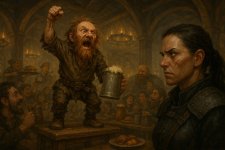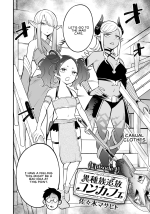Hur jag gjorde dvärgarna i Heroica (
https://www.rollspel.nu/threads/min-fantasyvärld-heroica.86323/), främst inspirerade av Slaine:
Dwarves
Dwarves are not the noble folk of legend. They are squat, short-limbed creatures with thin arms and legs, sagging bellies, and faces often flushed from strong drink. Their voices are rough and nasal, and their laughter is the kind that makes people wish for silence.
They are notorious for their disagreeable temperaments. Quick to insult, shameless in their greed, and relentless in their complaints, dwarves test the patience of nearly everyone they meet. Their company is rarely enjoyed, but tolerated because of two things: their knack for craft, and their overall harmlessness.
When they work, they can be brilliant. A dwarf with hammer and chisel, or with needle and thread, can produce work of astounding quality. But they rarely apply themselves without either coercion or bribery, and beer is the most reliable fuel for their industry. Threats come second. Many employers find that the easiest arrangement is to keep a keg close at hand and a whip ready for when the keg runs dry.
Habits and Character
Dwarves live for the moment. Any coin that falls into their grubby hands vanishes in days, squandered on beer, food, gambling, or harebrained schemes. Each dwarf claims to be on the verge of a great fortune—digging for gold in some forgotten streambed, buying a warehouse of spoiled grain that they are certain can be sold to someone, or inventing a new tool that will revolutionize farming (though it usually breaks within a day). These plans almost always collapse, leaving them right back where they started, begging for another drink or another chance.
They are infamously lecherous, with no sense of propriety when it comes to courtship. Advances are often crude and unwanted, and many dwarves carry the marks of well-deserved slaps. Yet they are also quick to grovel, falling to their knees with a pitiful whine when confronted, swearing eternal loyalty until the sting wears off and the cycle begins again.
Despite their faults, dwarves are rarely cruel. They may be selfish, vulgar, and greedy, but they lack the malice required to be true villains. For this reason, they are often regarded as pests rather than threats.
Society and Place in the World
Dwarves have no homeland of their own. They drift between cities and kingdoms, attaching themselves like barnacles to the powerful. Some find a place as craftsmen, others as jesters or fools kept around to amuse their betters. They never form lasting communities of their own, preferring to live as tolerated outsiders in the lands of others.
- The Empire: Dwarves are given unusual freedom. Though technically “owned,” they are not automatically enslaved in the same way as other non-humans. They are seen more as tools that wander away if not watched carefully.
- Lumekhet: Here dwarves are considered living charms. To own a dwarf is a sign of prosperity and fortune. Many nobles keep one or two, dressing them in fine silks and showing them off at banquets like prized pets.
- Mataraaj: Dwarves are distrusted, thought of as sly and conniving. Their natural nosiness and shamelessness make them excellent spymasters, and many lords employ them in this role, though always under careful watch.
- Elsewhere: Most people simply tolerate them as drunken nuisances. When dwarves overstep, which they inevitably do, they are slapped back into place.
Religion and Magic
Dwarves have no gods of their own. Instead, they mumble whatever prayers are expected where they live, treating faith as another way to curry favor or avoid punishment. As for magic, they are wholly unsuited to it. Their attention wavers, their patience frays, and their discipline crumbles. The most they manage is a drunken chant that makes sparks sputter from a campfire before they fall asleep in it.
----
Har också följande flavor story, centrerad kring Otto the Dwarf, som jag tycker ger rätt känsla:
Millford was a sleepy harbor town at the edge of Ardenvale, where the air smelled of roast meat and wet wood, and every street led to a tavern. The Waverider had anchored for repairs and rest, but by sunset of the first night, Otto the Dwarf had vanished.
Venera found him soon enough.
The “Copper Cauldron” was the largest inn on the docks, and tonight it was bursting at the seams. Halflings darted between tables with trays stacked high with pies, roasted potatoes, and mugs of amber ale. A pair of dockside giants, hunched under the rafters, clinked tankards the size of buckets and sang badly out of tune. The smell of meat, sweat, and spilled beer filled the air so thick you could almost chew it.
And at the center of it all, standing on a table, swaying, beard full of crumbs, was Otto the Dwarf.
“...and when the mast snapped clean in two, did I run below deck? No!” he shouted, thumping his chest. “...the bloody mast snapped, but I, I, patched it mid-storm, with one hand and a gods-damned seagull for a hammer!”
The crowd howled with laughter. Someone tossed him a mug, which he caught and drained in one go.
“Another round for the hero!” a halfling called.
“Ah, just a few more drinks!” bellowed one of the giants, slapping the table so hard a roast duck bounced onto the floor.
Venera pushed through the crowd, her patience worn thin. “Otto the Dwarf!”
He looked down from his table, eyes glazed and grinning wide. “Ah, Pillowtits! You came to cheer your favorite dwarf!”
The tavern roared.
Venera’s slap cracked through the air like a whip crack.
Otto the Dwarf blinked, rubbed his cheek, and grinned again. “Deserved that. Still, ye could’ve waited till after the next round.”
He tried to step down, but on the way past her, he gave her rear a fond pat.
The second slap nearly spun him sideways.
The halflings cheered. The giants booed. “Let him finish his drink, lass!” someone shouted.
“Back to the ship,” she said through her teeth, grabbing him by the collar.
Otto the Dwarf threw up his hands. “All right, all right! I’m going! No need to bruise me ego more than you’ve bruised me face!”
The crowd parted for them, jeering good-naturedly as Venera dragged the dwarf out through the door, boots scraping, beard trailing like a banner of disgrace.
“Another ale for his courage!” a halfling called after them.
By the time they reached the Waverider, the moon was high and Otto was sober enough to curse at the tools waiting for him. Under threat of another slap, or worse, he went to work. The sound of hammering echoed across the water well into the night.
When Venera came back to check on him a few hours later, the deck was quiet except for one tremendous snore. Otto the Dwarf lay sprawled beneath the newly patched section of hull, a bottle on his chest, his beard full of sawdust and satisfaction.
The work was perfect.
Venera folded her arms, sighed, and muttered, “Miracle-working drunkard.”
Without opening his eyes, Otto the Dwarf grunted, “Best kind.”
She smiled despite herself. “If the ship ever sinks, I’m throwing you overboard first.”
He snored louder in reply.
The Waverider rocked gently in the harbor, while Millford’s laughter drifted faintly from the shore, the sound of a town that never stopped eating, drinking, or forgiving fools like Otto the Dwarf.







